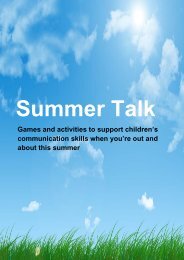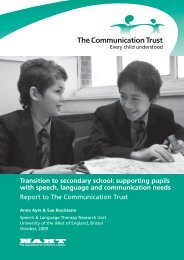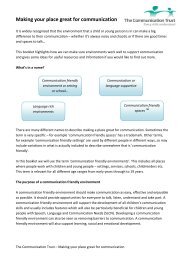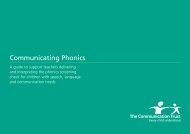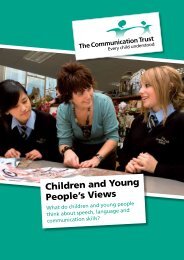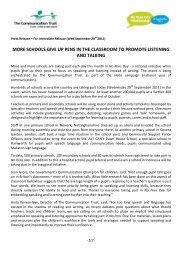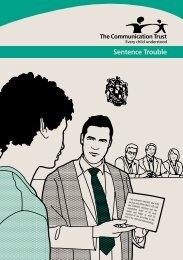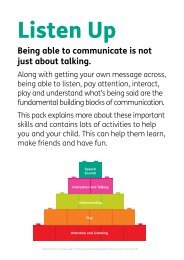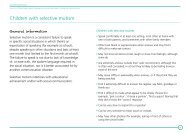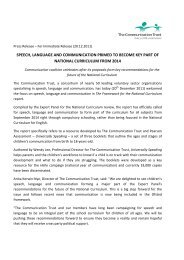A Generation Adrift - The Communication Trust
A Generation Adrift - The Communication Trust
A Generation Adrift - The Communication Trust
Create successful ePaper yourself
Turn your PDF publications into a flip-book with our unique Google optimized e-Paper software.
References<br />
1<br />
Clegg, J. (2004) Language and Behaviour: an<br />
exploratory study of pupils in an exclusion unit.<br />
Proceedings of the British Psychological Society<br />
Developmental Section Annual Conference,<br />
Leeds, September.<br />
2<br />
Bryan, K., Freer, J., and Furlong, C. (2007)<br />
Language and communication difficulties in<br />
juvenile offenders. International Journal of<br />
Language & <strong>Communication</strong> Disorders, Vol. 42,<br />
No. 5, Pages 505-520).<br />
3<br />
Davies, K. et al (2004) An Evaluation of the<br />
Literacy Demands of General Offending<br />
Behaviour Programmes. Home Office Findings<br />
233.<br />
4<br />
Mercer, N. and Littleton, K. (2007) Dialogue<br />
and the Development of Children’s Thinking.<br />
London: Routledge.<br />
5<br />
Roulstone, S., Wren, Y., Bakopoulou, I. and<br />
Lindsay, G. (2012) Exploring interventions<br />
for children and young people with speech,<br />
language and communication needs: A study<br />
of practice. Better <strong>Communication</strong> Research<br />
Programme, Department for Education.<br />
6 <br />
Dockrell, J., Bakopoulou, I., Law J., Spencer,<br />
S. and Lindsay, G. (2012) Developing a<br />
communication supporting classrooms<br />
observation tool. Better <strong>Communication</strong><br />
Research Programme, Department for<br />
Education.<br />
7<br />
Bercow, J. (2008) <strong>The</strong> Bercow Report: A Review<br />
of Services for Children and Young People (0–19)<br />
with Speech, Language and <strong>Communication</strong><br />
Needs, Department for Education.<br />
8 <br />
Tickell, C. (2011) <strong>The</strong> Early Years: Foundations<br />
for life, health and learning. An Independent<br />
Report on the Early Years Foundation Stage to<br />
Her Majesty’s Government.<br />
9<br />
Nutbrown, C. (2012) Foundations for quality -<br />
<strong>The</strong> independent review of early education and<br />
childcare qualifications.<br />
10<br />
Allen, G. (2011) Early intervention: the next<br />
steps – An Independent Report to Her<br />
Majesty’s Government.<br />
11 <br />
Field, F. (2010) <strong>The</strong> foundation years:<br />
preventing poor children becoming poor adults.<br />
<strong>The</strong> report of the Independent Review on<br />
Poverty and Life Chances.<br />
12<br />
<strong>The</strong> <strong>Communication</strong> <strong>Trust</strong> (2012) Goodbye,<br />
Hello http://www.thecommunicationtrust.org.<br />
uk/media/27944/helloevaluationreport_-_<br />
final.pdf<br />
13<br />
ibid<br />
14<br />
Ruben R. J., Redefining the survival of the<br />
fittest: <strong>Communication</strong> Disorders in the 21st<br />
Century, 2000.<br />
15<br />
Ofsted (2012) <strong>The</strong> report of Her Majesty’s Chief<br />
Inspector of Education, Children’s Services and<br />
Skills: Schools.<br />
16<br />
Locke, E., Ginsborg, J., and Peers, I. (2002)<br />
Development and Disadvantage: implications<br />
for early years. International Journal of<br />
Language & <strong>Communication</strong> Disorders. 27 (1).<br />
P.3 -15.<br />
17<br />
Waldfogel, J. and Washbrook, E. (2010) Low<br />
income and early cognitive development in the<br />
28 A <strong>Generation</strong> <strong>Adrift</strong><br />
U.K. London: Sutton <strong>Trust</strong>.<br />
18<br />
Gregory, S. (2012) Investing in their future: how<br />
do we ensure our children get the good quality<br />
early years provision they need if they and the<br />
country are to succeed in the future? Ofsted<br />
Early Years Annual Lecture.<br />
19<br />
CBI (2012) First Steps: A new approach for our<br />
schools CBI. http://www.cbi.org.uk/campaigns/<br />
education-campaign-ambition-for-all/newapproach-for-schools-infographic<br />
20<br />
Specific language impairment (SLI) is a<br />
developmental disorder where language<br />
difficulties are out of line with a child’s<br />
other abilities and with no obvious cause or<br />
impairment.<br />
21<br />
Goswami, U., and Bryant, P. (2007) Children’s<br />
Cognitive Development and Learning (Primary<br />
Review Research Survey 2/1a) Cambridge:<br />
University of Cambridge Faculty of Education<br />
and literacy.<br />
22<br />
Eastman, A. (2011) No excuses: A review of<br />
educational exclusion. Centre for Social Justice.<br />
23<br />
Snowling, M. J., Hulme, C., Bailey, A. M.,<br />
Stothard, S. and Lindsay, G. (2011) Language<br />
and Literacy Attainment of Pupils during<br />
Early Years and through KS2: Does teacher<br />
assessment at five provide a valid measure<br />
of children’s current and future educational<br />
attainments? Better <strong>Communication</strong> Research<br />
Programme. Department for Education.<br />
24<br />
Gross, J. (2011) <strong>The</strong> contribution of oral<br />
language skills to school improvement and<br />
outcomes for children and young people.<br />
Office of the <strong>Communication</strong> Champion.<br />
25<br />
Snowling, M., and Stackhouse, J. (2006)<br />
Dyslexia, Speech and Language: A Practitioners<br />
Handbook. Dyslexia Series. Chichister: Whurr<br />
Publishers Ltd.<br />
26<br />
Hartshorne, M. (2006) Speech, Language and<br />
<strong>Communication</strong> Needs and Literacy Difficulties.<br />
I CAN Talk Series, Issue 1.<br />
27<br />
Hirsch (1996) <strong>The</strong> Effects of Weaknesses in<br />
Oral Language on Reading Comprehension<br />
Growth. cited in Torgesen, J. (2004) Current<br />
issues in assessment and intervention for<br />
younger and older students. Paper presented<br />
at NASP Workshop.<br />
28<br />
Snow, C. E. (1999) Why the home is so<br />
important in learning to read. Paper presented<br />
at the George Graham Lecture in Reading,<br />
Charlottesville, VA.<br />
29<br />
Feinstein, L., and Duckworth, K. (2006)<br />
Development in the early years: Its importance<br />
for school performance and adult outcomes<br />
(20) London: Centre for Research on the Wider<br />
Benefits of Learning.<br />
30<br />
Dockrell, J., Ricketts, J., Palikara, O., Charman,<br />
T., and Lindsay, G., (2012) Profiles of need<br />
and provision for children with language<br />
impairments and autism spectrum disorders<br />
in mainstream schools: A prospective study.<br />
Better <strong>Communication</strong> Research Programme.<br />
31<br />
Better <strong>Communication</strong> Research Programme.<br />
32<br />
ibid<br />
33<br />
Howe, C. and Mercer, N. (2007) Children’s<br />
Social Development, Peer Interaction and<br />
Classroom Learning. Primary Review Research<br />
Survey 2/1b. Cambridge: University of<br />
Cambridge Faculty of Education.<br />
34<br />
Durkin, K. (1995) Developmental Social<br />
Psychology. Oxford: Blackwell.<br />
35<br />
St Clair, M., Pickles, A., Durkin, K., and Conti-<br />
Ramsden, G. (2011) A longitudinal study of<br />
behavioral, emotional and social difficulties in<br />
individuals with a history of specific language<br />
impairment (SLI). Journal of <strong>Communication</strong><br />
Disorders. 44 (2). p. 186–199.<br />
36<br />
Vallotton, C., and Ayoub, C. (2011) Use<br />
your words: <strong>The</strong> role of language in the<br />
development of toddlers’ self-regulation.<br />
Early Childhood Research Quarterly. 26 (2). p.<br />
169–181.<br />
37<br />
Clegg, J. (2004) Language and behaviour: an<br />
explanatory study of pupils in an exclusion unit.<br />
British Psychological Society Development<br />
Section Annual Conference, Leeds.<br />
38<br />
Arnold, D. H., Kupersmidt, J. B., Voegler-Lee, M.<br />
E., and Marshall, N. A. (2012) <strong>The</strong> association<br />
between preschool children’s social<br />
functioning and their emergent academic<br />
skills. Early Childhood Research Quarterly. 27<br />
(3). p. 376–386.<br />
39<br />
Strand and Lindsay (2012)<br />
40<br />
Meschi, E., Micklewright J., Vignoles, A<br />
and Lindsay, G. (2012) <strong>The</strong> transitions<br />
between categories of special educational<br />
needs of pupils with Speech, Language and<br />
<strong>Communication</strong> Needs (SLCN) and Autism<br />
Spectrum Disorder (ASD) as they progress<br />
through the education system. Better<br />
<strong>Communication</strong> Research Programme.<br />
41<br />
Better <strong>Communication</strong> Research Programme.<br />
42<br />
Klee, T. (2007) Screening 3-year-olds for<br />
language delay using selected parent-report<br />
measures: the jury is still out., Evidence-<br />
Based <strong>Communication</strong> Assessment and<br />
Intervention. 1(2). p. 58-59.<br />
43<br />
Laing, G. J., Law, J., Levin, A., and Logan,<br />
S. (2002) Evaluation of a structured test<br />
and a parent led method for screening for<br />
speech and language problems: Prospective<br />
population based study. British Medical<br />
Journal. p. 325 (1152).<br />
44<br />
Lee, W. (2013) Talk of the Town evaluation<br />
report. <strong>The</strong> <strong>Communication</strong> <strong>Trust</strong>.<br />
45<br />
Dockrell, J., Ricketts, J., Palikara, O., Charman,<br />
T., and Lindsay, G. (2012) See endnote 30 for<br />
the full reference.<br />
46<br />
Conti-Ramsden, G., Simkin, Z., and Botting,<br />
N. (2006) <strong>The</strong> prevalence of autistic spectrum<br />
disorders in adolescents with a history of<br />
specific language impairment. Journal of Child<br />
Psychology and Psychiatry. 47 (6).<br />
47<br />
Ofsted, (2010) A statement is not enough -<br />
<strong>The</strong> special educational needs and disability<br />
review.<br />
48<br />
McLaughlin, M. J., Dyson, A., Nagle, K.,<br />
Thurlow, M., Rouse, M., Hardman, M., Norwich,<br />
B., Burke. P. J., and Perlin, M. (2006) Crosscultural<br />
perspectives on the classification of




